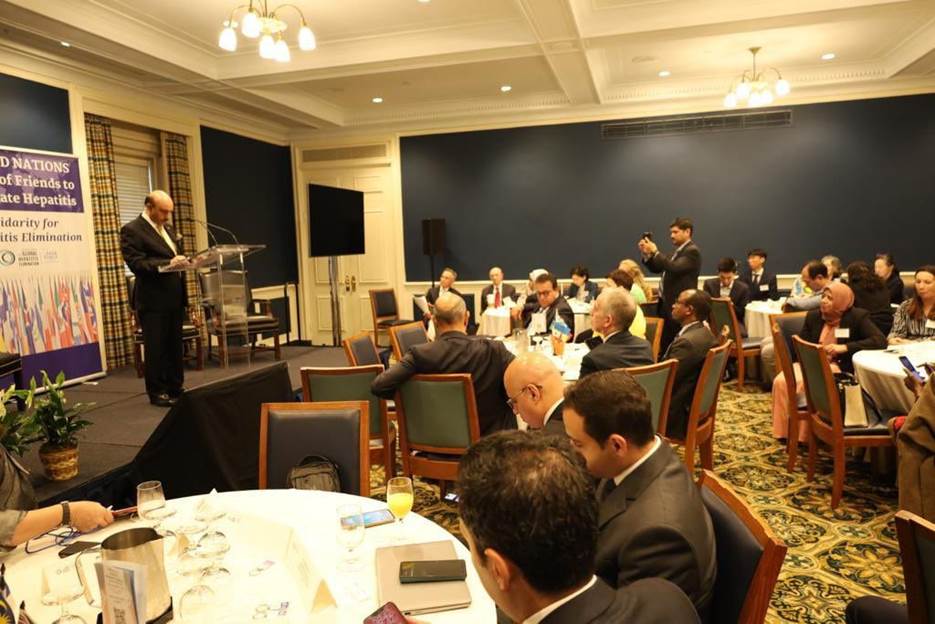

“Pakistan remains steadfast in its dedication to addressing the challenge of hepatitis and achieving the World Health Organization’s global elimination targets by 2030,” Ambassador Masood Khan said
Ambassador Masood Khan Reaffirms Pakistan’s Commitment to Eliminate Hepatitis by 2030
By Elaine Pasquini

New York City: Following the General Debate of the 78th session of the United Nations General Assembly, Masood Khan, Pakistan’s Ambassador to the United States, addressed the second annual meeting of the United Nations Group of Friends to Eliminate Hepatitis at the Yale Club on September 24, 2023.
“Pakistan remains steadfast in its dedication to addressing the challenge of hepatitis and achieving the World Health Organization’s global elimination targets by 2030,” the ambassador said. “Our priorities include updating the National Strategic Framework, improving surveillance, expanding Hepatitis B birth dose vaccination, increasing HCV testing and treatment, and engaging community-based organizations. These steps will bring us closer to eliminating hepatitis as a public health threat by 2030.”
Thanking the United Nations Group of Friends to Eliminate Hepatitis for convening the session, Ambassador Khan noted that the objectives of the Group of Friends aligned perfectly with the overarching theme of the UNGA78, focusing on rebuilding trust and rekindling global solidarity to accelerate the progress of the 2030 agenda aimed at peace, prosperity, progress, and sustainability for everyone.
Other attendees at this important meeting included Egyptian Health Minister h Dr Khaled Abdel Ghaffar, Health Administer to the President of Ghana Dr Anthony Nsiah-Asare, Somalian Health Minister Dr Ali Haji Adam, Portuguese Health Minister Dr Manuel Pizarro, Ugandan Health Minister Dr Jane Ruth Aceng Ocero, along with global health experts and World Health Organization officials. Dr Harvey J. Alter, recipient of the 2020 Nobel Prize for Medicine for discovering the Hepatitis C virus, was also present.
According to estimates, some 12 million people in Pakistan are infected with Hepatitis B and C with 150,000 new cases reported every year. These multifaceted challenges stemmed from unsafe blood transfusions, unhygienic dental treatments and reused syringes.
Ambassador Khan related that under the launch of the National Hepatitis Elimination Profile in 2022, the Pakistani government has set an ambitious target aiming to screen millions of individuals and treat millions affected by hepatitis by 2030. “However, this program, requires adequate funding to become a reality,” he added.
Pointing out that Pakistan’s response to COVID-19 had enhanced its testing capacity, improved electronic health reporting and strengthened coordination between provinces and the federal government, the ambassador reaffirmed that Pakistan was committed to addressing challenges and moving closer to its hepatitis elimination goals.
In addition, Ambassador Khan said Pakistan deeply appreciates the pivotal role of its international partners, particularly the Global Alliance for Vaccines and Immunization (GAVI) in the fight against hepatitis. “GAVI has contributed expertise and resources enabling Pakistan to address this challenge effectively,” he stated.
Pakistan has also formed partnerships with the corporate sector through Corporate Coalition for Viral Hepatitis Elimination in Pakistan consisting of 12 leading companies. These alliances, the ambassador explained, have strengthened Pakistan’s resolve to eliminate viral hepatitis by 2030.
“Successful HCV (Hepatitis C Virus) micro-elimination programs have been implemented in both the public and private sectors, demonstrating our commitment to results,” he said, adding that Pakistan is committed to building strong partnerships, both domestically and internationally, to ensure the success of its hepatitis elimination efforts.
“Together as a global community we can and must eliminate hepatitis, securing a healthier future for all,” the ambassador concluded.
Ambassador Khan thanked Dr Nida Ali, Hepatitis Elimination and Research Outreach Fellow, the Coalition for Global Hepatitis Elimination and the Task Force for Global Health USA for inviting him to address the meeting.
(Elaine Pasquini is a freelance journalist. Her reports appear in the Washington Report on Middle East Affairs and Nuze.Ink.)

